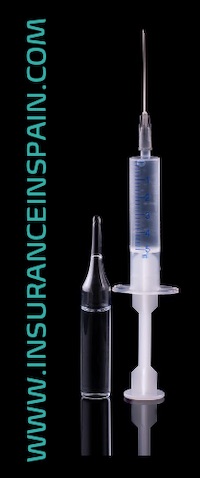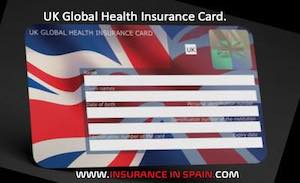Private health insurance for residency in Spin for Expats in English
PRIVATE HEALTH INSURANCE IN SPAIN
PRIVATE HEALTH AND MEDICAL INSURANCE IN SPAIN – AN EXPAT GUIDE TO PRIVATE HEALTH INSURANCE COMPANIES IN SPAIN.
CORONAVIRUS IN SPAIN - DOES MY PRIVATE HEALTH INSURANCE COVER IT ?
Yes, Health insurance policies contracted through us do cover any symptoms and treatment for the Coronavirus in Spain. Several clients have contacted us in this regard and a Spokesperson for the health insurance companies we use have confirmed that the private treatment of any symptoms of the coronavirus is covered under their health insurance policy. However, if the World Health Organisation changes the current status to the Coronavirus being a World Wide epidemic, then all treatments will be covered by the government health authorities.
PRIVATE HEALTH AND MEDICAL INSURANCE IN SPAIN
Firstly, it is very important to note that all Private Health and Medical insurance plans and policies in Spain are based on your individual circumstances, your age, your physical and mental health, as well as any pre-existing conditions and the type of health insurance plan you contract.
If you are buying a health insurance plan just to cover you to legally be in Spain and obtain your Residencia, don’t expect it to cover you for much. Expectations on health insurance cover is very high and it will not cover you for every health eventuality.
Common sense should prevail, and you must speak to a Health Insurance professional if you are not familiar with the types of cover available. There are so many different levels of cover that they do need to be customised or tailored to your requirements otherwise you will be paying for what you don’t need.
PRIVATE HEALTHCARE IN ENGLISH IN SPAIN.
Contracting important health insurance in Spain should be done with care and you must read the terms and conditions of any policy. I know, it’s a real pain, but some unscrupulous providers may not be fully qualified or knowledgeable enough on the product information to know what they are actually selling you. Check, check and check again.
How to get expert Private Health and Medical Insurance advice in Spain.
Contact our team of Health insurance experts who will find you the right type and cover you need at an affordable price. Our service is free of charge, completely confidential and you are not obligated to buy anything from us. We are here to help you in the best way we can for any type of insurance in Spain.
PRIVATE HEALTH AND MEDICAL INSURANCE QUOTES IN ENGLISH.
We provide private Health insurance in Spain to Expats living, working or just retired in Spain in English. Our range of Health Insurance policies is extensive and there is a plethora of medical insurance coverage to protect you should you become ill. Health insurance in Spain policies are based on an annual premium, and the premiums are governed by your state of health, age and if you have any pre-existing conditions.
PRIVATE HEALTH AND MEDICAL INSURANCE FOR RESIDENCY IN SPAIN.
Applying for a residencia in Spain, a permit that allows you to stay in Spain for more than 90 days, is often ignored by tourists. If you are planning to live here or stay in Spain for longer than 90 days of any given year, you are required by law to obtain a residency permit. The law states that foreign residents from any of the other EU countries, must apply for the certificate or residency in Spain.
DO I NEED PROOF OF PRIVATE HEALTH INSURANCE?
If you are under pensionable age, you will be required to provide proof of having Private Health Insurance as you will not be accepted into the Spanish National Health System unless you are working or are self-employed in Spain. Proof of having a private health insurance will be required for obtaining your Residencia.
FAQS
How to change my Health Insurance cover in Spain? Are there any English speaking doctors in Spain?
What is a Spanish SIP Card? Emergency numbers in Spain
What is covered on the new GHIC Card? What is a TSE Card?
Does Spanish private health insurance cover Dental care? Is cosmetic surgery covered by Private health Insurance?
GET A COMPARISON INSURANCE QUOTE FOR HEALTH INSURANCE IN SPAIN FOR EXPATS
Proof of income for residencia purposes.
To obtain a valid Residential permit or certificate, you will also have to prove that you can afford to support yourself and your family to live here or have an adequate pension. if you are a pensioner proposing to live in Spain, earning at least €800 a month, then that is fine. Stock, shares, investments, property and other assets can also be taken into account.
Employment contracts and residencias in Spain.
If you have a job in Spain, or at least a part time job that provides an income of €800 or more then you will also qualify for residencia status and are not required to provide proof of private medical or health insurance as you will be classified as a wroker in Spain and be automatically included and paying for your Social Security and therefore exempt. You will then be entitled to use the Spanish National Health System.
Duration of private health Insurance Policies in Spain.
Health insurance policies in Spain run from January to December. If you take out a new policy in August, you will only pay the premium due from August to December, a period of 5 months, but you will be contracted for a minimum of 12 months, so you will have to renew the Health Insurance policy in January for another year.
Changing Private Health Insurance providers in Spain.
Speaking to a qualified Health or medical Insurance specialist will ensure that you have the right insurance policy to suit your needs and will avoid the necessity of cancelling and changing to another Health Insurance provider at the end of the year. Continuity of the Health Insurance contract is what they are expecting, as the premium rates for joining increase with age. This health insurance premium increase depends on the Health insurance company, as most have increments in premiums every 5 years, depending on your insurance claim history.
Pre-existing health conditions for private health insurance in Spain.
Some health insurance policies do cover pre-existing health conditions, as we are not all in perfect health as we get older. Some add extortionate premium penalties and others will accept some pre-existing medical conditions if you are transferring from one health insurance company in Spain to another.
Cancelling or transferring Private Health Insurance in Spain.
Cancelling health insurance in Spain should be carefully considered. You will have to give the health insurance provider a minimum of 2 months’ notice of cancellation. If you want to shop around do it in October. This is when the Health insurance providers are more anxious to get your business, as the end of October is the last real chance you have of changing without any financial penalty.
Health Insurance companies will insist that you renew the policy if you try and cancel it in the last two months of any given year and they have been known to pursue clients in court to get their money.

Private Health Insurance Guarantees.
There are quite a number of private health insurance companies in Spain. Most only speak and provide Health insurance policies in Spanish. If you want to contract one of the local Spanish health insurance Companies, make sure you understand the “small print”.
Private Health Insurance Small print in Spain.
We can provide you with Private Health insurance policies in English and go through all the health cover offered. Not everything is covered unless you take out some of the Elite Health policies that can be very expensive, and all of this will depend upon what health concerns you have.
Specialised Private health Insurance for Residential purposes only.
Health insurance companies in Spain have now realised that they have an opportunity to get into providing a special health insurance policy, that has the minimum amount of health or medical cover and that is purely intended for the purpose of obtaining your Residencia in Spain. These are more like budget Health Plans. Cheap and cheerful health insurance cover that gives you the proof you need to satisfy the government bodies that require it.
How Private Health Insurance Companies Operate in Spain.
Health insurance Companies that are geared specially towards the Expat marketplace in Spain provide several methods of operating.
-
List of Doctors in Spain – by Private Health insurance companies.
Health insurance companies contract Doctors in the local hospitals and local surgeries or consultation rooms and provide an extensive list in the form of a booklet. This is the list that Doctors surgeries and clinics that you can choose to use.
If you have a specific Doctor in Spain that you would prefer to use, you need to ask that Doctor which Health Insurance Company he works for. Some Doctors work for several different health insurance companies in Spain at the same time and also work within the Spanish National Health System.
-
A credit card system – by Private Health insurance companies.
Health insurance companies will issue you with a plastic card similar to a credit card which you must show each time you make a Doctor’s appointment. The Doctor’s surgery will swipe the card to indicate to the Health insurance company that you are having a consultation with the Doctor in Spain and register it with the Health Insurance company. This then means that the Health insurance Company will then pay for the private consultation.
-
Tokens and Voucher Systems for private health insurance.
You can also be given or buy booklets of vouchers or tokens and you will give one of these books of vouchers or tokens to the Doctor’s surgery or medical clinic each time you have a consultation. These vouchers usually cost about €2-€3 each and you are usually given a free book of 5 vouchers at the start of each year. There are advantages here in the fact that the Health insurance company in Spain may have a slightly lower joining premium.
English speaking Doctors near me.
There are thousands of English-speaking Doctors in Spain, especially along the Costas where foreign tourists tend to flock or live. Many private Doctors have their own private surgeries and clinics and use most of the more dominant Health insurance companies.
Finding an English-Speaking Doctor near you.
Find an English-speaking Doctor near you. Make sure that your mobile phone or computer has your location services switched on and the link above should find a selection of English-speaking Doctors near you.
Chemists and Pharmacies in Spain.
Almost all villages, towns and cities in Spain have a number of Spanish pharmacists or dispensing chemists nearby. You will recognise them as having a green plus type sign outside their premises. Opening times vary between 8 am and 9 pm. Late night pharmacies in Spain operate on a rotating system to provide out of hours services, so that at least one of them is available 24 hours a day-somewhere near you.
If you locate a pharmacy and it is out of hours, check on the door as they will have a list of pharmacies nearby that are open for the night and indicate their own opening hours and which day of the week, they are open 24 hours.
If you have developed an illness, allergy, or a non-urgent illness or you are just not feeling well, visiting a local chemist might be your first port of call. Pharmacists are qualified to diagnose and provide medication for some emergency treatments and offer advice on what might be the most suitable medication and provide it for you.
Medication in Spain.
Medication is not normally available in Hospitals or at medical clinics or Doctor’s surgeries as most don’t have their own pharmacists on the premises. This is hopefully changing as they are starting to see the financial opportunities and need for having pharmaceutical services in house.
Prescriptions in Spain
Once a doctor has given you a prescription you can take it to any pharmacy in Spain and they will dispense the medication. If the medication is not available, the pharmacist will either order it for you for the next day or advise and authorise a similar medication. Spanish Pharmacists are more highly qualified than many other European countries and can therefore prescribe such things as anti-biotics as an over-the-counter medication.
Costs of Medication in Spain.
It comes as no surprise that medication in Spain is so much cheaper than in the United Kingdom. If you are working and have your NIE Number, (a number that identifies you as a Foreign National living in Spain) your medication is subsidised, and you will only be required to pay about 10% of the medication costs. This may also apply to pensioners that are resident in Spain as they have State imposed price restrictions on medications.
Different Autonomous regions in Spain, and there are currently 17 different ones, create their own rules and so you should check with the local town hall or pharmacy to see what situation will apply to you.
Is the cost of Medication in Spain covered by Health insurance?
Not normally. Medication in Spain is relatively cheap and so the Health insurance companies will not cover medication provided as an outpatient visiting a local surgery. In the event that you are taken to a hospital in the event of an emergency, medications used in your treatment for that emergency are normally covered. Post-operative medication may not be if you are given a prescription.
SPANISH SIP Cards
A SIP Health Card, or Tarjeta Sanitario Individual, as it is known in Spanish, is a credit style plastic card which you present at any Hospital or medical center in Spain to get treatment on the Spanish National Health System.
Renewing your Spanish SIP Card.
Renewing an existing Spanish SIP card or replacing a lost one is quite simple. Go to your local health canter with a copy of your passport, a current padronamiento (Padron – A document from the town hall that verifies your residential address and anyone else that is registered or lives at that address - making sure it is valid, as they are only valid for a period of three months and cost about 3€), a copy of your old or lost SIP card, and present it to the receptionist at the health center.
They will then provide you with either a temporary card or document until the permanent card is ready. It may also be prudent to take your digital Signature information with you. A digital signature is extremely useful when dealing with taxation and government bodies in Spain and will provide the Health Service with your taxation records and how much discount you will be entitled to under the Spanish national Health System when paying for your prescriptions or medication.
The Spanish SIP medical Card.
Prescription medication rates have been set by the government and are entirely dependent upon your situation. A Spanish SIP medical card entitles you to use the Spanish National Health System. The intention is that the Spanish SIP card is linked to your personal tax information by means of a microchip impregnated into the SIP card itself.
If you have not made a Spanish Tax declaration as an annual or permanent resident of Spain, even if it is a zero-rated declaration, there will be no indication on your card, to advise the pharmacist or dispenser of the medication you need, as to the amount of discount you are entitled to on your payment for medication.
As a non-pensioner you will then pay 40% of the full prescription charge and pensioners will pay 10%.
This new process of collecting your data does mean that some medical treatments are no longer available on the Spanish National Health System and you will have to pay the full price of any medication required. If you require specialist medication or expensive medications, please check that they are available on the Spanish National Health System before deciding to move to Spain. Not everything is covered.
Exclusions for paying for drugs or prescription charges in Spain.
- Those receiving some social security benefits or ‘social integration’ Status.
- Certain levels of disability.
- Those with Toxic Syndrome.
- Those who have contracted an occupational disease.
- Those who have had an accident at work.
- Those who have lost their entitlement to unemployment benefit.

Vaccinations in Spain.
Parents want to make sure that their child is vaccinated or immunised against the most common diseases. Vaccination processes in Spain are similar to that of the rest of Europe including the United Kingdom. Each child up to the age of 14 in Spain is assigned a Paediatrician at the local Centro de Salud or (Medical Centre) to monitor or advise on which and when certain common vaccinations are required.
When registering yourself and your family at the local health center, they will ask for details of your child’s vaccinations to update their records and then provide you with a small booklet of records of vaccinations and immunisations. They will then inform you, probably through the school network, or when you next visit the doctor, when the next Vaccination is due and are free of any charges.
If you choose not to immunise your child, you may find it difficult to get them into some Spanish Schools and local clubs without a record of their immunisation against certain contagious diseases.
EMERGENCY AMBULANCE, FIRE OR POLICE SERVICES IN SPAIN
In the United Kingdom we are all primed from an early age to call 999 in any form of emergency. You then explain your situation and the 999 call center will request the relevant Emergency Service to tend to your Emergency. In Spain it is very different.
In Spain the EMS or Emergency Medical Service can differ depending on the Autonomous region or province that you live in. Additionally, there are a number of privately funded and non-profit organisations that provide ambulance services.
 In some cities and towns in Spain you can also pre-register with an ambulance service so that they have details of your location etc. on file so that in any emergency where you do require an ambulance, they already know where you live and can get there quickly. This is not a free service, so it is worth checking with the Red Cross or Cruz Roja, as it is known in Spain, to register. In Javea for example, the Red Cross/Cruz Roja membership is a minimum of €30.00 but prefer if you “donate €36.00 and for companies between €150-€200 and is Tax deductable.
In some cities and towns in Spain you can also pre-register with an ambulance service so that they have details of your location etc. on file so that in any emergency where you do require an ambulance, they already know where you live and can get there quickly. This is not a free service, so it is worth checking with the Red Cross or Cruz Roja, as it is known in Spain, to register. In Javea for example, the Red Cross/Cruz Roja membership is a minimum of €30.00 but prefer if you “donate €36.00 and for companies between €150-€200 and is Tax deductable.
Emergency Medical Services in Spain.
In the United Kingdom we are all primed from an early age to call 999 in any form of emergency. You then explain your situation and the 999 call center will request the relevant Emergency Service to tend to your Emergency. In Spain it is very different.
In Spain the EMS or Emergency Medical Service can differ depending on the Autonomous region or province that you live in. Additionally, there are a number of privately funded and non-profit organisations that provide ambulance services.
In some cities and towns in Spain you can also pre-register with an ambulance service so that they have details of your location etc. on file so that in any emergency where you do require an ambulance, they already know where you live and can get there quickly. This is not a free service, so it is worth checking with the Red Cross or Cruz Roja, as it is known in Spain, to register. In Javea for example, the Red Cross/Cruz Roja membership is a minimum of €30.00 but prefer if you “donate €36.00 and for companies between €150-€200 and is Tax deductable.
Aa Campaign in Spain.
The Red Cross in association with the Ministry of the Interior launched a campaign in 2009 called help us to help you. Aa- ayudanos a ayudarte. They are asking everyone to create a new contact in their mobile phones under the heading Aa and enter the telephone number of the person you would like to contact in the event of an emergency. Some smart mobile phones have this facility integrated into your contact list and normally appears as a big red asterisk next to the contact indicated as the person to call.
Family Membership of Ambulance Associations.
Ambulance Associations are common, and you can join as a family membership for about €40.00. You get a family membership number to the Emergency Ambulance association and free transport to the local or nearest hospital and reduced rates for transfer to other hospitals in Spain.
Ambulance Services with Health Insurance policies.
For any Emergency or Medical service in Spain call 112 or 061
Known locally as SAMU or SEM, the prehospital emergency care system is staffed by doctors and nurses and is available all over Spain.
Some Health Insurance Companies do include the cost of transportation to and from Hospitals in an Emergency situation. Check your private Health insurance policy or call your Insurance Agent or Spanish Health insurance Company to verify that you do have ambulance cover. Not all Health insurance policies have the Spanish Ambulance service cover as standard.
Air Ambulance Services Spain-UK
If a patient contracts Coronavirus Covid 19 and requires an air ambulance, the Spain to UK is certified as a safe route and the return journey is also permitted.
Medical repatriation from Spain.
There are a few companies offering a repatriation service to the UK from UK based companies. These are private companies and some of the Health Insurance companies will contract their services if needed and if your health insurance package has the cover for repatriation. Repatriation can be by road or air, depending on the situation.
These services can offer doctor and nurse support as well as being able to recover relatives, friends and family. All are qualified, including the driver and can usually be in place to repatriate within a few hours, depending on the medical needs of the patient.
Patient transport on a commercial flight.
Medical Escorts.
Patients can travel on a commercial flight accompanied by a medical professional as long as they have medical clearance and have been medically examined and classed as fit to fly. Once this is done, logistic teams will organise the route, aircraft transfers, ambulance transfers and contact the required hospitals and arrange for the liaison with hospitals at both ends.
NEW GHIC MEDICAL CARDS
What is the new GHIC card?
APPLYING FOR A FREE UK GHIC - GLOBAL HEALTH INSURANCE CARD.
The UK Global Health Insurance Card GHIC, is free and gives you the right to access state-provided healthcare during a temporary stay in the European Union (EU). The GHIC is valid for a period of 2 years and can be renewed online.
Always check the Government website for information on any travel restrictions or notices that might apply to your destination.
EHIC European Health Insurance Cards issued in the UK are still valid as of Jan 2021 and offer exactly the same cove in Europe. Once your EHIC expires it will be replaced with the GHIC when you renew your expired card.
WHAT DO I DO IF I DON’T HAVE AN EHIC OR GHIC?
If you are abroad and need treatment you can apply for a Provisional Replacement Certificate (PRC). Most people can apply for a GHIC online, although there are some people that will need to apply by post.
All EHIC or GHIC or PRC cards are free of charge, so be careful when looking online as there are quite a few unofficial websites that charge for their services to get it for you. The best way is to apply for your GHIC now, on the official website.
WHO IS ENTITLED TO A GHIC.
Access to a GHIC is determined by residency in the UK. If you are a resident of the UK and you are entitled to treatment on the NHS National Health Service then you would be entitled to a Global Health Insurance Card.
If you are not entitled to a GHIC and you are insured in another country, example:- you have a SIP card in Spain, but live in the UK, you should apply to the Spanish authorities for your EHIC.
If you change your residency status, moving from the UK to Spain, you will lose your entitlement to the GHIC as you will be required to register in Spain and get your SIP card. For travelling in Europe from Spain, you may obtain a TSE (Targeta Sanitaria Europea) a card that entitles you to free medical assistance in Europe.
If your circumstances do change, say you become a resident of Spain, and you use your GHIC abroad, you could be charged for the full amount of the treatment you receive.
GHIC for families.
Each member of the family requires an individual GHIC. You can make a family GHIC application online for you and on behalf of your family. The quickest way to apply for a card is to call them from abroad on 0044 191 279 0575
WHAT DOES THE GHIC COVER?
When visiting any European Union country, you can get emergency or necessary medical and health treatment from state services using the GHIC. These medical treatments and healthcare services only apply to those treatments that cannot reasonably wait until you return to your home country.
These include:-
- Emergency treatments and visits to the Accident and Emergency services.
- Treatment for long term and pre-existing medical conditions.
- Routine medical care or treatment for pre-existing conditions that need regular monitoring.
- Oxygen and kidney dialysis.
- Routine maternity care as long as you are not going abroad to give birth in that country.
If you are in a position whereby you know you are going to need any form of medical monitoring, you should make sure that you pre-arrange your treatments and make sure that they are not with a Private Medical Provider, as treatments covered by your GHIC only apply to treatments received within the State Healthcare Network.
IS ALL STATE HEALTHCARE SERVICES FREE ON MY GHIC?
No, they aren’t. Not all State healthcare systems offer everything for free and there may be cases where some treatments that you may normally get free on the UK healthcare system, the National Health Service, are not free in European Countries, and you may have to pay for those services.
Does my GHIC cover me on a cruise?
If you fall ill on an aircraft or cruise ship, your GHIC will cover you for emergency, necessary medical treatment when you arrive at your destination in the EU.
WHAT IS NOT COVERED BY THE GHIC?
Both GHIC and the older EHIC only cover you for treatments in any EU country with the exception of Iceland, Liechtenstein, Norway and Sweden.
Whichever country you visit and find it necessary to use your GHIC, bear in mind that not all State Healthcare systems are the Same. In some countries you may need to pay for some treatments that you may expect to get free in the UK.
Others state healthcare systems require you to pay a percentage of your treatments to the State, known as co-pays. Whatever country you are in, you can be expected to receive the same treatment as residents of that country would receive from their own State Healthcare System. So, if that means you having to contribute towards the costs, that what applies.
Get more information on accessing healthcare for UK nationals and residents visiting the EU.
THE GHIC AND TRAVEL INSURANCE.
The GHIC is no substitute for Trave Insurance. It will NOT cover ANY Private medical treatments, or any form of rescue from ski slopes, mountains or the sea, and will not cover any form of repatriation if you need to be flown back to the UK.
You should always have a GHIC and good Travel Insurance before you travel. Some travel insurance companies are now insisting that you have a GHIC when applying for travel insurance as the GHIC ensures that you can access EU State healthcare treatments in an emergency.
If you are planning to go abroad to take advantage of their free healthcare treatments or to have a child, or to give birth, you will not be able to get that treatment using your GHIC.
CLAIMING FOR TREATMENT ABROAD.
Not all countries offer as many free treatments as they do in the UK. In some countries you may be expected to pay for some treatments upfront and then claim it back from the UK government system.
If you are applying for a refund, you will need to provide receipts and any relevant paperwork such as doctors reports etc. If you are in a country where you have to pay a co-pay, (your contribution to the costs) you will not be able to claim the co-pay back from your GHIC.
If you need further clarification or advice, you can call the Overseas Healthcare Service. 0191 218 1999, Monday to Friday 8am to 6 pm.
S1 Form.
What is an S1 form?
An S1 form was previously known as the E121. The S1 certificate is a healthcare certificate that entitles you and any of your dependents to the same healthcare entitlements as those residents of the country you are going to. The S1 is applicable to non-residents of the UK and applies to those who are ordinarily resident in another EU country. UK residents cannot request an S1 form.
If you are moving from the UK to another European country you should register with an S1 form instead of using your EHIC or GHIC to receive Medical or Healthcare treatments as a resident, or potential resident of that country.
If you are moving to Spain and are not entitled to free Healthcare on the State system, you may be required to obtain Private Healthcare Insurance in Spain to get your residency permits.
If you are a resident of Spain the S1 certificate can be used by all state pensioners to receive treatment on the NHS in the UK as if they were residents of the UK.
HOW TO GET YOUR TSE – TARGETA SANITARIA EUROPEA IN SPAIN.
What is the TSE card and who is it for?
Basically, the TSE card is a card that residents of Spain can get for use when travelling in Europe and entitles residents of Spain, who have the right to public healthcare in Spain, to free healthcare in European countries, similar to the UK EHIC or GHIC as it is now known.
Can Spanish residents use the TSE in the UK?
The TSE can be used anywhere in Europe for medical emergencies or treatments when you visit any countries in Europe.
HOW LONG IS A TSE VALID FOR ?
A TSE is valid for two years from the date of applications for those applying for themselves and their dependants. Your TSE card will have an expiration date on it and this will tell you when renewal is needed. We would advise applying months before it is due for renewal as Bureaucracy and red tape are now causing delays.
How to get one?
Online.
You can apply for a TSE online Some difficulties have been experienced online and we would advise that those seeking a TSE to get in touch with a local Gestor (Lawyer), to arrange an appointment for you.
If you have a digital signature certificate with your password, you can log in to the system and locate the social security page. You can also apply by SMS, be able to identify yourself if your social security number is registered, and then request a card.
Please Note:- Online applications seem to have been blocked as they now require you to attend in person, provide identity documents and sign paperwork. So this is all subject to change.
NURSING HOMES, CARE HOMES AND CARE AGENCIES IN SPAIN.
RESIDENTIAL HEALTHCARE IN SPAIN.
Residential healthcare in Spain is available, unfortunately no known insurance companies offer any kind of insurance policies to provide funds to cover you for treatment or stays in residential or care homes in Spain.
Residential health care or end of life healthcare is traditionally carried out by the families, as a family obligation. With the Spanish accepting this obligation and healthcare for the elderly being carried out at home, therefore there has been little provision made for any residential care outside the family unit.
Over the past decade or so, with the influx of Expats retiring in Spain, has created a need for elderly healthcare and homes for residence to live out their lives. This need is being filled by private healthcare companies and private retirement homes. It is not cheap and as the demand rises, places are hard to find. If you are thinking about private healthcare in Spain in the next few years, book early to secure a place. Retirement homes and care facilities may only have places when one of the residents passes away.
Although Japan has the highest level of people over 80, Spain is close behind and is likely to have the highest elderly population in the world in the next 30 years.
Expats have taken upon themselves to create these lucrative care homes in Spain where live in residence have one of the best climates in Europe to live in.
Costs of Residential Care in Spain.
Whilst the average cost of live-in healthcare in the UK is about 3,500 GBP, the Spanish homes are relatively inexpensive at around 1,900 GBP. Expect that to rise over the next few years as Expats live longer.
Paying for private healthcare or residential care is therefore going to be very expensive, and one must consider making provision for this, much earlier in life. Many are fortunate enough to have large properties or villas that can be sold to cover the costs, as little government support is available.
There are a number of Care Agencies in Spain that cater to British speaking Expats. Many are private individuals that are working without permits or registered as official carers. This is common, and they can be found on Facebook, in the local papers, or by word of mouth. Someone knows someone who has cared for a loved one and will help you find a recommended Nurse or Private Carer that can help you.
Depending on the area and the length of time carers are needed, they are normally paid by the hour and the current rates are ( Costa Blanca) about 15 Euros an hour. This is for private individuals, as official Carers can cost considerably more as the company they work for has to pay their social security payment and have contractual obligations with health and safety and other criteria to make sure that you, or the person requiring the care, is looked after properly.
LIVE IN CARERS IN SPAIN.
Independent living.
Independent living is what most people seek to achieve in their old age. Having a roof over their heads, medical needs taken care of, human company and friendship, assistance and long- term security taken into account so they can continue to live, relax and enjoy their way of life
Assisted living in Spain.
Assisted living can vary depending on how much you can afford to pay. There are some companies trying to promote assisted living in luxury retirement villages for the wealthy. These have all the modern conveniences of a 5 Star hotel with exceptional well-being and healthcare facilities on site with swimming pools, gyms, Spas and more.
The retirement village concept is small in Southern Europe and most independent non care long term senior locations operate an exclusive sales based operation.
Live in Carers.
Many elderly Expats opt for having a live in Carer. Those with homes in Spain are reluctant to give up their homes and move into a specific care home designed for the elderly. Can’t say I blame them, but they need care, food cooking for them, washing them and keeping the house tidy and clean and general living requirements, that will depend upon their mental and physical state.
Live in Carers may come from the UK, specifically to look after an elderly person. The carer will be provided full time accommodation, either within the house or on the property nearby.
Food and transport are normally provided, and air fares can be included. Depending on the extent of the care needed, some carers will get days off or reduced hours, or a substitute carer will come in for a few hours to offer some relief to the live-in carer.
Private Nursing Care in Spain.
Due to the costs involved, many Expats that are too old to look after themselves may have family in the UK that cannot look after them in Spain. Having made Spain their home they are reluctant to give up their Spanish lifestyle and elect to have home help or nursing assistance or a carer visit and look after them in the short term, until they require a 24-hour facility.
Returning to the UK will not automatically provide any assistance for homecare, or a place in a care home, even if you have been in the military or have served your country in some way.
If you feel things are heading in this direction and you want to go back to the UK to be taken care of, make enquiries well in advance. Some local councils may be able to find a space if you can contribute towards your upkeep.
Can I go back to the UK and get looked after in my old age?
Private healthcare is available in the UK, but you will need between 30-40K to be a resident of a full-time care home facility if you can find a place. Contact your local Council, they can point you in the right direction. If you are looking for residential care, you may have to contribute to the costs, prove you have no funds or wealth, sell your existing property and have paid into the UK national health system with National Insurance contributions.
Retirement properties and care homes.
Independent living can be achieved at retirement homes specifically built for that purpose and can offer a package of support that allows people to do just that. Some packages include individual residential properties that are looked over 24/7 offering security, peace of mind and allows you to carry on your life as normal.
You will be part of a caring community with many like-minded people within the complex or retirement village with assistance and medical treatment or carers at hand. Transport or assisted living may be included depending on the facilities offered or those that you need.
Overseas Care homes in tropical locations.
Overseas care home sand end of life facilities are growing. With the increase in the elderly population, companies have seen the need to provide quality care at an affordable cost. Many European residents are seeking their final years in Exotic locations like Thailand, where the care cover can be anything from visiting you once a week to take care of your needs at home such as cooking, cleaning and arranging medication or home meals, to full time dementia care.
These locations are much cheaper than European care homes and can have the advantage of having a very happy and well-presented location with Thai staff that really love taking care of their elderly friends and family.
PREGNANCY AND CHILDBIRTH IN SPAIN.
If you are travelling to Spain and you are pregnant, no Private healthcare insurance is available to you as this is considered to be a pre-existing condition. This does not mean you can’t pay for any treatment, but the health insurance companies will not accept anything to do with the pregnancy or the childbirth if conducted in Spain.
Private health insurance companies will require you to have had your private insurance healthcare plan in place from anything from 6-12 months prior to pregnancy before offering cover for any maternity costs. Public healthcare for pregnancy or childbirth have no restrictions.
If you are a legal resident working in Spain, you are entitled to free public healthcare if you chose to give birth in a local hospital in Spain.
Public Hospital Births.
Public hospitals are very busy, and the doctors are in short supply. The doctor that delivers your baby will not be the same as the doctor that took care of your pregnancy. You may not get as much personal attention from the nurses or midwife.
Public Hospitals all speak Spanish as it is, after all, Spain. Communicating, if you don’t speak Spanish could be an issue as some do not allow translators. Check with the hospital what is allowed.
Public hospitals are claimed to perform less c-sections than private hospitals. You may have a public hospital assigned to the birth, unless you go into labour far from the hospital and there is a nearer alternative.
Visitations can be restricted to a maximum of 2-4 hours a day with a restriction on numbers that can visit.
Sharing a room.
Protocols are different, in so much as you may not be able to request a water birth, or home birth, or your own birth plan being instigated, and you will probably have to share a room.
You will need to take your own personal belongings including those needed for the baby such as diapers, toiletries, clothes and blankets
Private Hospital Births.
With private medical and health care insurance in Spain you can elect to choose the hospital you wish your baby to be born at.
Private hospitals are likely to have a wider range of specialists and you can ask for a particular doctor to handle the birth, see it through the whole period and be there to deliver your baby, hence getting the doctor that is familiar with your case. He will likely have the same midwife you are using as well as other specialists such as an anaesthetist, and a neonatologist.
Shorter waits for appointments, and visitors are welcome at any time and you will have a private room to yourself or even a suite.
Private hospitals also have a lot of other services available such as offering water births or a birth plan to suit you. Photographers and hairdressers are available and a spare bed for the father may be permitted.
Not all private hospitals have all of the specialist equipment they need and in the event that they don’t. you may be referred to a public hospital for treatment.
If you only speak English, your support team at a private hospital provided by your private health insurance company will speak English fluently as well as your doctor which allows for better communication. Spanish public hospitals will all speak Spanish, although some can speak English, if you can’t speak Spanish, you may have some difficulties in communications. Some may allow translators, but you will have to ask as all public hospitals have different rules.
Gas and air are not allowed in Spanish hospitals, epidurals and pethidine are available.
Home birthing in Spain.
Home birthing in Spain is not provided by the Spanish healthcare System. If you want private home births you will need to find a private maternity hospital or general hospital that offers these facilities. Home birthing is not common in Spain and the costs to do this are approximately €2,000. It can be easily arranged by talking to your local healthcare center or private doctor.
Private healthcare insurance policies can cover Home Births in Spain, depending on the provider and the type of cover you have opted for.
Family Assistance in Hospitals.
Spanish hospitals have some of the best healthcare in Europe. After care is another matter. With the focus on providing healthcare to resolve your ailments, the aftercare could be said to be seriously lacking. In Spanish hospitals it is expected that the family will be there to provide aftercare and look after you.
The Spanish doctors and nurses are there to offer treatments and help save lives, whereas the family would be expected to step in with aftercare and making the patient feel comfortable.
The costs of giving birth in Spain.
Public hospital births are free of charge. The costs of private hospital care via private health insurance for pregnancy and childbirth will depend on the cover you have contracted with the health insurance company.
Talk to us. We will provide you with a large selection of Private Health Insurance options that cove a variety of childbirth and childcare options. This is a totally free, private and confidential service and you are under no obligation to buy any products from us. Our health insurance professionals are here to get you the best for your money and assist you in any way we can.
Pre-natal care in Spain.
Both private and public healthcare centers offer and provide a complete pre-natal education program. These can be attended by the father and can start from the 25th week of pregnancy. What to expect and preparation for labour, breathing and relaxation techniques and feeding the infant will be part of the pre-natal classes in Spain.
Registering a birth in Spain.
All births must be registered in Spain within 8 days. This can be extended to 30 days with good reasons. It is the parents responsibility to do this and must be carried out in person or by a relative. Some hospitals will provide the facility to register the birth from hospital or the clinic.
This is Spain. The paperwork is exhausting, depending on whether the child is born inside or outside marriage, previously divorced etc. you will need all the relevant paperwork, medical delivery reports, NIE numbers, divorce documents, marriage documents and in the case of a separation, two independent witnesses, and most of this could be done at the clinic of birth.
Check with the clinic to see what documents are needed as there are specific documents to cover every conceivable conception.
BIRTH AND CHILD CARE BENEFITS IN SPAIN.
If you have to stop working during your pregnancy, what benefits can you expect.
The benefits you are entitled to as a registered worker in Spain can be complex for both mother and employer. We would recommend that you contact with your Gestor to see what you are entitles too as the rules do change from time to time.
We are referring you to the European Commission for birth and child-care benefit, risk during pregnancy and breastfeeding for Spain.
Dental health Insurance plans in Spain.
Health insurance plans in Spain do not normally include cover for any dental requirements. Health insurance companies in Spain can include dental health plans as a supplement or add-on to your health insurance policy. Yes, you have to pay a little extra, making it affordable dental care.
Dental health is more important today than ever and having a dental health insurance plan can save you a lot of money. There are a host of covers depending upon what you feel you might need, and the prices are reflective of cover.
Cover can include the diagnosis and prevention, extractions, fillings, endodontics, periodontics, preventive odontology, prothesis, aesthetics, oral surgery implantology and orthodontics.
There are no age limits for contracting a dental plan in Spain and you don’t necessarily need the health insurance plan in Spain to take out a dental plan offering no limitations for some pre-existing conditions.
Cancelling a private health insurance policy in Spain.
Cancelling a health insurance policy mid-term can be tricky. They don’t like it as you are under a written obligation to pay for a full years cover. (Jan-Dec). If you contract a health insurance policy in Spain in October, they will oblige you to continue the policy for a minimum of the next year as short-term health and medical insurance is not available.
Renewing or changing your private health insurance provider in Spain.
If you want to change or renew your insurance provider after at least a year, you need to start looking around in November at the latest as health insurance companies insist that you give them at least one month’s written notification, If you file on the 1st of December you will be obligated to renew with your existing health insurance company.
Spreading the cost of your private health insurance in Spain.
Health insurance companies look for annual premiums, paid up front. They will allow you to pay the balance of the years premium due if you are contracting from February onwards. Monthly payments, quarterly payments and bi-annual payments may be offered to loyal customers.
Can Private Health Insurance companies cancel my policy?
Health insurance companies and services can be cancelled at any time. Most now add a guarantee for life on policies. What this means is that once you have a Health Insurance policy with them, they will not cancel your policy, other than for non-payment, and promise to offer you cover, regardless of the number of claims you make, or from the deterioration of your health.
Levels of Private health & Medical insurance cover in Spain.
The sky is the limit. Whatever you can afford is available at a price. Annual policies for €20,000 + are becoming common, particularly when family cover is needed.
Worldwide and International private health insurance cover.
People do travel for work or pleasure, more extensively than ever before. (Covid lockdowns the exception in 2020, 2021 and beyond). If you have a Health and Medical insurance policy in Spain there is International and worldwide cover with caveats.
There may be limits on what you can have done abroad, with elective and non-emergency treatments being excluded or may not be covered.
Emergency treatment in any European country may be covered, but to limits of about €12,000 depending on the company, and you should always cover yourself with travel insurance before any trip abroad or in Europe.
If you have a Spanish SIP card, it will provide you with reciprocal emergency treatment in Europe, but not in America. Private American health insurance is expensive and health insurance companies in Spain will only provide minimal cover.
Medicine and Medications in Spain.
Co-pays in Spain.
Medications, when applied in a hospital or clinical environment for an emergency treatment may be free of charge if you are a resident of Spain. However, medicines for continued treatments as an outpatient may not be.
If you are a Spanish resident working in Spain and are earning more than €18,000 a year you are required to pay 50% of the costs of the prescribed medication. Anyone earning below €18,000 a year will have to pay 40∞ of the price of the prescribed medication. Earning more than €100,000 a year and you pay 60% of the costs of medication.
Pensioners that have made an annual tax declaration will only pay 10% for a Spanish prescription with a maximum payment of €8 per month.
Prescribed drugs for children and those with disabilities may receive free treatments and medications if the disability is classified as over 65% and for children under 198 with 33% disability.
Non-prescription drugs can be purchased at most pharmacies and you will pay the market price for those drugs.
Cheaper drugs in Spain.
Medicines in Spain and prescription drugs are significantly cheaper than in most other countries due to the unrestrictive distribution of medications that are prescription drugs as there are state imposed price restrictions. Getting a prescription from your doctor will be cheaper, even for drugs that don’t need a prescription, so always ask your Doctor for a prescription if you feel you need drugs that don’t need to be prescribed for you.
Buying generic drugs rather than the defined branded drugs, can reduce the cost of your medication, as the generic drug may not come in fancy packaging or have a well-known branded name. You can search the NHS Medicines A-Z to find the same medication in generic form and always ask the pharmacist if an alternative is available if you want to save money.
Pharmacies in Spain.
Pharmacies or Farmacias as they are known in Spain are easily spotted as they have the green cross as their symbol. They are extremely well trained and will advise you on most types of medication and be able to treat minor ailments over the counter.
They are not substitute doctors, their advice is free and valuable when Doctors surgeries or clinics are closed, and they take turns to operate a 24-hour service on a rotation basis. This is particularly useful on the many bank holidays we have in spain.
If the pharmacy you visit is closed, it should tell you which is the nearest open pharmacy near you and provide the address and telephone number, either on the door or window of the shop.
Local Village Health centres in Spain.
It is quite surprising how many small local villages in Spain have their own Health Centres. They may not be open all day, offer a community health centre where local people, including Expats with a residence permit or those that are working in Spain, facilities to see the local GP, but not all can be expected to speak English.
You will have to provide your SIP card to get an appointment or be seen by a Doctor. Your SIP card number details all the tax contributions you have made and allow the correct prescription charges to be applied to any medication or prescriptions you have.
Get information you are unsure about in writing, or email. This will cover you if they say you have cover and when you come to need that cover, it is not covered. This is your health, you are paying for it, so you should get the right advice.
Well Woman & Well Man clinics in Spain.
It’s nice to know that you can make an appointment once a year to have a complete check-up and perhaps a blood test, as a check on your health. You might feel fine, but having a check-up will give you the confidence in knowing that the internal workings of your complex body system is not going crazy.
Depending on the cover, some private health insurance policies provide this on an annual basis, but it is not always the case. Blood tests and other checks can be carried out by your Doctor as part of an investigation to find the cause or issues of a problem.
Full check-ups for no reason, other than to satisfy your own mind as to the health state of your body, you may have to pay for, or ask a Well Man or Well Woman clinic to undertake on a private basis.
COSMETIC SURGERY ON PRIVATE HEALTHCARE INSURANCE IN SPAIN.
Cosmetic and elective surgery.
Any cosmetic or elective surgery is not likely to be covered with private health insurance in Spain, Reconstructive surgery in the event of an accident is covered by most healthcare policies and may also be covered by the likes of your car insurance company if the reconstructive surgery has been caused by a car accident.
Elective surgeries such as breast implants and gender re-assignment surgery are not covered.
CANCER COVER WITH PRIVATE HEALTH INSURANCE.
Most top health insurance plans will cover you for a whole range of cancers and the treatments needed. The amount of cover and treatment may be limited to a maximum amount. It is all related to the type of plan and comes down to getting what you pay for.
Mastectomy Cover.
Mastectomy and reconstructive surgery after a mastectomy is covered by many Health insurance companies. Not always the case with the cheaper policies and we advise talking to one of our professionals if you have any concerns with this type of health cover.
Hip and knee replacement surgery.
Hip and knee replacement or corrective surgery is covered by most private healthcare plans. You may be asked to actually pay for the prothesis, so check before requesting an operation.
Private healthcare in Spain and Pre-existing conditions.
Pre-existing medical conditions has always been an issue with Healthcare cover in Spain. If you have a relatively minor pre-existing condition, they may accept it and not load your premium. For ongoing pre-existing conditions which may require long term care, health insurance companies are likely to load you premiums to take account of the pre-existing condition.
Changing from one health insurance provider to another in Spain.
If, for whatever reason, you are not happy with your current healthcare provider, you can change to another one. Your claims history may be taken into account along with any pre-existing conditions. You will be required to complete and pay for the full year on your existing health insurance policy and give them ample notice of cancellation.
Don’t cancel your policy and then make the change. Make sure that the Health insurance provider you want to contract, will accept your medical history first, as you don’t want to be left with no Health insurance cover.
Private and Healthcare tourism in Spain.
It is believed that Spain can expect 200,000 Health tourists in 2021. (This figure is no longer realistic as we are in the middle of a Covid 19 pandemic) but it highlights the growing and increasing trend of visitors coming to Spain to get some of the best healthcare treatments in the world.
Which treatments are most in demand?
Spain is Europe’s leader in the number of fertility treatments carried out because legislation is favourable, and Spain has one of the world’s highest success rates. Ophthalmology, orthopaedic surgery and plastic surgery are also high on the list as Spain has a healthcare system equipped with some of the best technology and surgeries using robot technology are on the increase.
How to make a claim on private health insurance in Spain.
General doctors visits.
Healthcare companies in Spain will issue you with a booklet promoting all of the hospitals and doctors that they use, all over Spain. You can use any of these appointed doctors that are on the list. There are no limits to the number of times you can visit your Doctor.
Some people chose a Health Insurance Plan that uses a specific Doctor, because they like and trust that Doctor as all Doctors don’t work or offer services to the same healthcare companies.
Assuming you are registered with this private clinic or Doctors surgery, it is a simple matter of taking your Private Health insurance card, a credit type card that provides your policy information and the type of health plan you have, and they will then ask you to sign a piece of paper, stating that you are there for an appointment. This allows the Doctor to claim for your consultation from the health company and for any treatments they might provide for you during that visit.
If you are just visiting your doctor for a minor ailment, all you have to do is make an appointment to see the doctor and go along at the appointed time.
If you have seen the Doctor and they refer you to a Hospital for further treatments or tests, the Doctor will normally make the appointments and advise you accordingly. They will also notify your health insurance company so that they can get approval for the hospital visit and testing.
If you require any form of surgery or emergency treatment, you or your doctor will have to notify the Health insurance provider to make sure that the operation or treatment being carried out is eligible under your Health Plan.
In Conclusion.
Health insurance plans and policies are as varied as humans are. They can be very complicated and some of the Spanish ones are difficult to interpret without a legalised translation. We would advise that you do contact a specialist so that you are well informed as to the nature and type of Health cover you are purchasing. There is no point in buying a health plan in Spain that is no good to you 10 years down the line.
This information is provided on the basis that it is as correct as we can get it at the time of publication and is for information and advisory purposes only. Rules and regulations regarding Health insurance in Spain changes regularly and we will endeavour to keep you up to date.




















